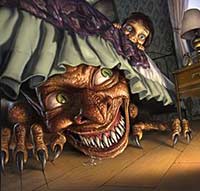Whose business is it anyway?
One of the many questions that inevitably come up in almost any poly discussion group, usually multiple times, is the question about being open about being polyamorous.
The same thing comes up in kink-related social groups, and I imagine in just about any other alternative sexuality group you can name.
Now, I’m a big fan of openness and transparency. There are a lot of reasons for that. On a philosophical level, I do not believe there is anything to be gained by pretending to be something you’re not, and I don’t see how deceiving people who would shun you if they knew the truth actually benefits anyone. (To my mind, if someone—your family, say—loves you only so long as they don’t know the truth about you, then they don’t actually love you. They only love an imaginary projection of you, and that love is conditional on you agreeing not to do anything that might spoil the projection.)
On a practical level, it’s hard to find other people like you when everyone is closeted. If I am polyamorous, and I’m in a room with 10 other poly people but none of us are open, all 11 of us might be thinking “Wow, I wonder where I can go to meet other poly people? It’s so hard to do!”
I've heard a lot of folks say “I’m not open because it’s nobody else’s business how I live my life.” And to some extent it seems true, but there are problems with that idea.
Before I talk about those, though, I’d like to back up a little and talk about the way I grew up.
I spent my elementary and middle school years growing up in the rural Midwest. This is where I lived:

See that clump of trees on the right? It’s where my old house is. We lived outside a tiny town called Venango, Nebraska, population (at the time) 242.
I’ve written about a trip I took as an adult through Venango, with lots of pictures, in my blog here. Time has not been kind to the town. It’s half deserted; many of the houses are boarded up, and the school closed a long time ago. The most eerie thing about it is the total and complete absence of children. We stopped at the playground behind the school when we visited it. All of the playground equipment is covered by a fine dusting of rust, and when we turned the merry-go-round, rust drifted off it in flakes. I have to think that if there was even one child left in the entire town, the playground wouldn’t be this disused.
 It was no picnic for me growing up there. I was the stereotypical geek as a kid; I was into model rocketry, and I owned a TRS-80 computer, the only computer of any sort in a 40-mile radius. (I know this because the only other computer within any distance was an Apple II belonging to the owner of the business my mother worked at in the next town over, about 45 minutes away; he used it to do bookkeeping.)
It was no picnic for me growing up there. I was the stereotypical geek as a kid; I was into model rocketry, and I owned a TRS-80 computer, the only computer of any sort in a 40-mile radius. (I know this because the only other computer within any distance was an Apple II belonging to the owner of the business my mother worked at in the next town over, about 45 minutes away; he used it to do bookkeeping.)
There were eight people in my middle school class, the largest class the school had seen in years. While I was teaching myself the basics of aeronautics, electronics, and Z-80 assembly language programming, the main topic of conversation among my peers was the relative merits of the Denver Broncos vs. the Dallas Cowboys—a discussion that often involved a great deal of heat but never seemed to get resolved, no matter how many times it was hashed out.
So it’s safe to say I grew up alienated from all the people around me.
Which is pretty unpleasant. I was able to partially mitigate the fact that I had no friends when my parents got me a 300-baud telephone modem, and for quite literally the first time in my life I was able to encounter, if only in a crude way, people who were kind of like me.
As alienated as I was, I still had some things going for me. One of the things I noticed growing up was the casual, offhand racism that permeated the Midwest; the people around me were quite confident that whites were better than blacks, even though most of them had, quite literally, never once met a person who was black. Even as an outcast, I still had some measure of privilege; it’s hard to say how much better or worse things might have been had I been a football-loving African American, or (worse yet) geeky and also black.
My parents moved to Florida when I started high school, so all at once I went from having 8 people in my class to having 2,000. For the first time in my life, I met other people who were like me. I was still something of an outcast from most of the folks around me, of course; the fact that there were other geeky, nerdy people in the school didn’t mean we weren’t a distinct minority. I was still introverted and painfully shy back then, but at least I had a social circle, something that was totally new to me.
What does this have to do with being out about polyamory? Quite a lot.
 After my first year in college, I made a conscious decision: I did not want to be introverted or shy anymore. I deliberately and systematically set about learning the skills that would get me there. I started choosing different kinds of people in my social circle. If I found a social situation that made me uncomfortable, I deliberately kept putting myself in it.
After my first year in college, I made a conscious decision: I did not want to be introverted or shy anymore. I deliberately and systematically set about learning the skills that would get me there. I started choosing different kinds of people in my social circle. If I found a social situation that made me uncomfortable, I deliberately kept putting myself in it.
It was about this same time that I started realizing that I was kinky and poly, as well. Prior to starting college, I wasn’t a sexual being in any meaningful sense of the word; I barely even recognized that boys and girls are different.
But even before I was interested in sex or relationships, I still knew I was polyamorous, though there was no language for it. The stories about the beautiful princess forced to choose between her suitors never quite made sense with me; if princesses live in castles, which seemed axiomatic to me when I was a kid, why wasn’t there room for all of them?
As a person newly interested in sexual relationships, that idea stayed. Why on earth should I expect someone to pledge her fidelity to me, simply because I fancied her? On the face of it, the idea just made no sense.
Growing up alienated seems to have had a positive side effect; I found out that being isolated from a social circle is inconvenient, but it isn’t fatal. I learned that I could find ways to interact with people like me, first online and then in person. And I learned that things like “being shy” and “having poor social skills” weren’t death sentences; they were things I could learn to cope with and skills I could acquire.
So in that sense, having an isolated childhood didn’t really leave that much of a mark on me. I was resilient enough to make choices about who I wanted to be and then find ways to be that person.
 In the 1990s, which is positively antediluvian as far as the Internet goes, I started working on a Web site. (The Wayback Machine only started capturing the poly section of the site in 2000, for reasons I don’t completely understand.)
In the 1990s, which is positively antediluvian as far as the Internet goes, I started working on a Web site. (The Wayback Machine only started capturing the poly section of the site in 2000, for reasons I don’t completely understand.)
The goal in making the site was to create the resource that the younger version of me would have found valuable. When I actually started doing this polyamory thing, I didn’t have the advantage of being able to learn from other people’s mistakes, which meant that I had to make my own…and while experience might be the best teacher, sometimes the tuition is very high.
The site became a whole lot more popular than I expected it to be, which pretty much finished off any chance I might have to be quiet about being polyamorous. Not that there was ever much chance of that to begin with, but still.
So I’ve never been closeted. Not even a little bit.
Which takes us back ’round to the issue of what business it is of anyone else’s.
On the face of it, “it’s nobody’s business who I’m involved with” seems to make sense…except that, in a very real sense, it is.
We live in a society that sanctions only one kind of relationship, and tends to stigmatize others.
 When a person wears a wedding ring and says in casual conversation “My wife and I went to dinner last night,” that person is validating those social conventions. He could say that it’s nobody’s business how he conducts his romantic affairs, of course; but the simple act of wearing a wedding ring is a public declaration of a very specific kind of relationship. And it’s hard to talk about the things we do, even casually, without talking about the people we do them with, and what those people’s relationships are to us.
When a person wears a wedding ring and says in casual conversation “My wife and I went to dinner last night,” that person is validating those social conventions. He could say that it’s nobody’s business how he conducts his romantic affairs, of course; but the simple act of wearing a wedding ring is a public declaration of a very specific kind of relationship. And it’s hard to talk about the things we do, even casually, without talking about the people we do them with, and what those people’s relationships are to us.
When folks at poly get-togethers talk about being closeted, by far and away the most common thing they talk about is being afraid of other people’s reactions to learning the truth. Essentially, it boils down to a very simple idea: “I want to control information so as to control the way people interact with me.” The fear of being shunned, and the extent to which people are willing to jump through hoops to control information and to create the impression of normalcy in order to avoid that fear, is sometimes quite remarkable.
I’ve never had the fear of how people will react to me for being polyamorous (or kinky or anything else). I’d like to think it’s because I’m, like, all evolved and stuff, but it’s really a lot simpler. I know what it’s like to be totally alienated from my peers. I know that I can survive it. I know that I can create my own social circles and my own family. I’ve met that monster under the bed. It has no power over me. If there’s a monster under my bed, it better pay me rent, just like anyone else living here.
I realize that I am in a privileged position about this. I work for myself; I don’t have to worry about a conservative employer firing me if they find out how I live my life. I’m not in the military. (Under the Uniform Code of Military Justice, adultery is a crime, punishable by dishonorable discharge, prison, or both.) I am not financially dependent on a family that would disown me if they found out. I don’t have children who might be vulnerable to being taken away, or an ex-spouse who can use polyamory against me in a custody hearing.
So I can be open about who I am, and I don’t have to worry about suffering for it.
And that’s kind of the point.
In a world where it really was nobody’s business how we conduct our private lives, nobody would have to worry about these things. Nobody would have to worry about getting fired or getting a dishonorable discharge or losing children because of being polyamorous. The fact that there are people who do have to worry about these things means that much of the world tries to make it their business how we conduct our romantic lives.
Polyamory, and homosexuality, and BDSM, and all kinds of other non-socially-sanctioned relationship structures are perceived negatively in part because people don’t often see them, and it’s easier to vilify something that you don’t see every day. Like the racists in Venango who’d never laid eyes on a black person, when you don’t have the experience of seeing something yourself, it’s easier to project all your own fears onto it.
When those of us who have a privileged enough position to be able to live openly choose to do so, we help create a visible face for polyamory that makes it that little bit harder for others to vilify or marginalize us. So in that sense, it very much is other people’s business what I get up to; by creating institutions that can be used against folks who are polyamorous, they’ve made it that way, whether we like it or not. By creating the social expectation that people in officially sanctioned relationships can advertise their relationship status but people who aren’t, can’t, they’ve made it that way.
Columnist Dan Savage started a campaign aimed at teen gays and lesbians called “It Gets Better.” Part of the campaign is to do exactly what is talked about in this essay: namely, to speak up when we see something wrong.
If the alienated, disenfranchised me from 1977 could see the me from 2012, he’d be amazed. The person I am today is the person the elementary-school version of me fantasized about being, and more.
But it took a lot of work to get here. And that’s why it matters. By being open about who I am, not only do I live my life without compromise, exactly the way I want to; I help make it that much easier for other people who, right now, don’t have a social group where they belong. I think that everyone who, like me, is in a position to be able to be out without risk, does a service to others by choosing to be so. It does get better, because we make choices that help make it better.

